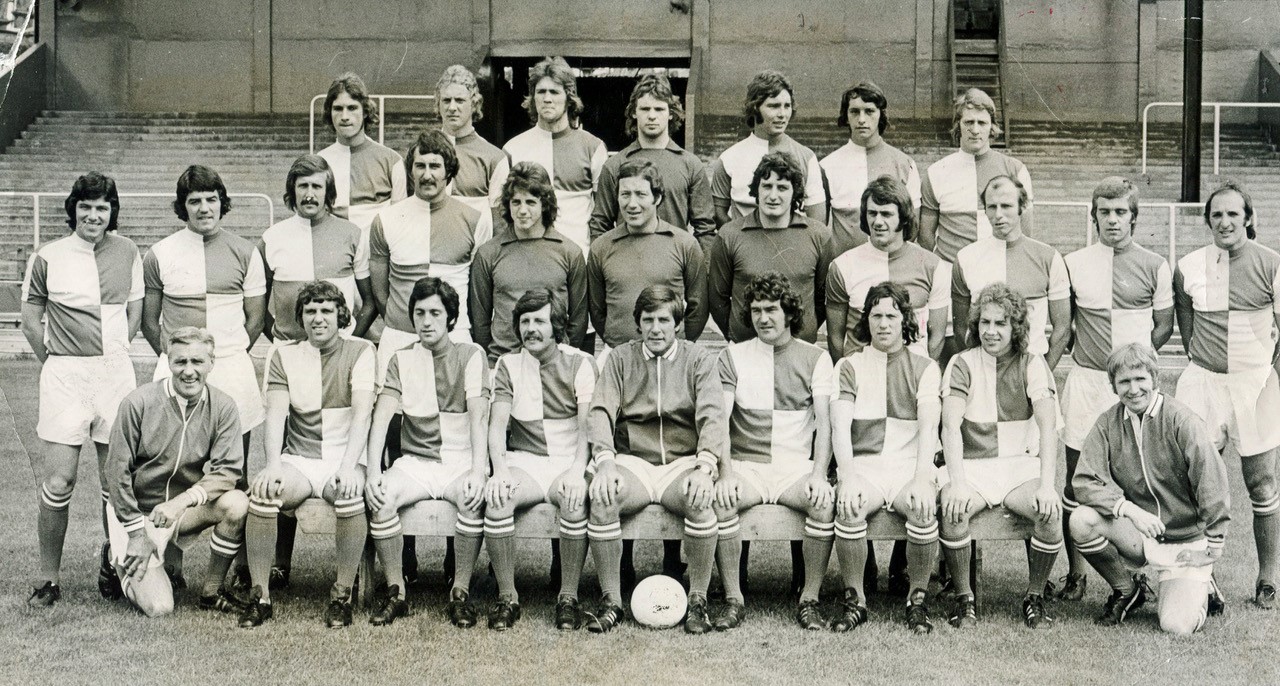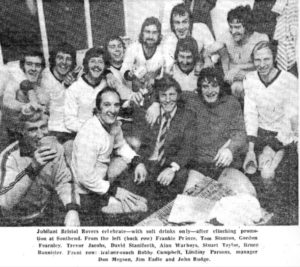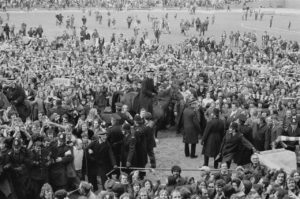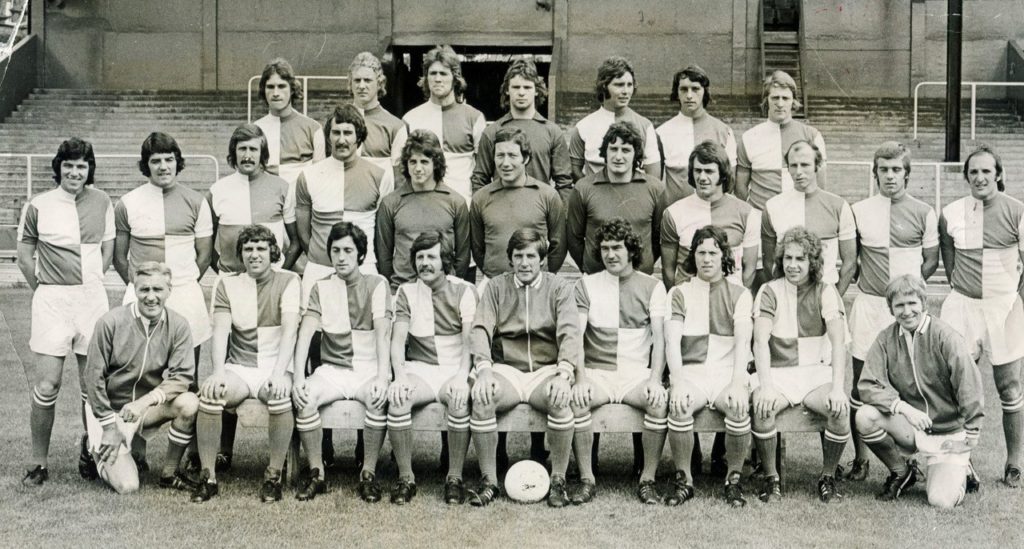PROMOTION TWO
Much to the delight of supporters Rovers were once again wearing their familiar blue and white quartered shirts at the beginning of this season, after sporting an all blue shirt for seven years.
They began the season with a 3-0 win over AFC Bournemouth and didn’t lose a league game until February 2nd 1974, a run of 27 unbeaten. As they had avoided defeat in the final five games of 1972/73, the unbeaten league run was actually 32.
Just five goals were conceded in the opening 16 games and by the time of that first defeat in early February, away at Wrexham, they had established a seven point lead at the top of the table.
As Rovers limped towards the finishing line, they were overtaken by eventual champions Oldham Athletic, whose 2-1 win at Eastville on April 13th 1974 proved crucial.
The promotion that everyone hoped for was finally achieved in the penultimate game of the season, a goalless draw at Roots Hall on Friday April 19th.
Over 1,000 Rovers fans were at the game and saw, according to the local press; ‘A thoroughly workmanlike, professional display by a Rovers side betraying few signs of the nerves which have haunted their recent matches.’
However, it was thanks to goalkeeper Jim Eadie that they gained the point they needed to make sure of promotion; ‘It needed the save of the season from Eadie, in the 74th minute, to keep out the eager Southend side desperately seeking a prestigious win over the Third Division leaders.
‘Winger Billy Coulson sent Terry Johnson through and his ferocious 20 yard rocket looked a goal all the way. But somehow, Eadie flung himself across his line to conjure the ball over the bar for a corner.’
It was, in all honesty, a game of few chances for either side but Rovers and their supporters were ecstatic at the final whistle as the point gained ensured they would be playing at a higher level in 1974/75.
Those who had travelled to Roots Hall rushed on to the pitch at full time and carried the players, shoulder high, to the dressing room before celebrating long into the night.
There were no celebrations for the players, though; with one game left to play they were still hopeful of clinching the Third Division title, even though they had played two more games than Oldham Athletic and York City, their two closest rivals.
The journey back to Bristol took rather longer than expected, as the coach carrying the team broke down at Chiswick. The relief coach didn’t materialise until around 8.00am on Saturday and the players eventually arrived back at Eastville at 10.00am that morning having slept very little during an uncomfortable stay in a service station!
The final game of the campaign was against Brighton & Hove Albion, at Eastville, on April 29th 1974 when a crowd of 19,137 saw Bruce Bannister score his 18th league goal of the season to earn his side a point from a 1-1 draw.
Unfortunately, it wasn’t enough to clinch the title; that accolade went to Oldham Athletic who ended the season as Champions with 62 points.
(photo courtesy of Alan Marshall)
Rovers’ better goal difference saw them finish as runners up with 61 points, the same number as third placed York City. All three teams were promoted.
Manager Don Megson was, understandably, delighted to have led his side to promotion and, writing in the matchday programme for that final game against Brighton, said; ‘It’s been a wonderful struggle and, particularly since Christmas, a very gruelling one but we have clinched promotion and that’s what we wanted to do.
‘It would not be right for me to single out individual players for praise at this time. Promotion has been achieved by outstanding co-operation within the squad of professionals. You cannot ask more from a player than to give his best and help his team colleagues and that’s what I’ve got from my players throughout the season.’
Of the 46 league games played that season, 22 were won, 17 drawn and seven lost with 65 goals scored and 33 conceded.
Four players, Jim Eadie, Trevor Jacobs, Stuart Taylor and Tom Stanton, were ever present while four more players, Bruce Bannister, Mike Green, Frankie Prince and Lindsay Parsons all appeared in over 40 games.
Rovers used a total of 19 players during the season and three players made their league debuts for the club; Trevor Jacobs, Gerry O’Brien and David Staniforth.
Alan Warboys was leading goalscorer in the league, with 22 goals from his 33 games while 14 different players managed to get on the scoresheet.
Whilst there were no seven goal wins during the season, there was a seven plus one, as Brighton & Hove Albion (who were beaten 7-0 in 1952/53), managed by Brian Clough, were beaten 8-2 at the Goldstone ground on December 1st 1973. (I’m desperately trying to keep the seven theme going!)
(photo courtesy of Alan Marshall)
Keith Brookman




